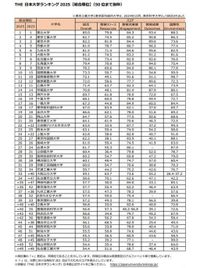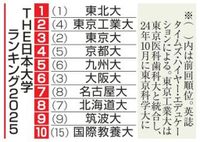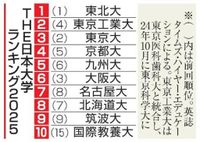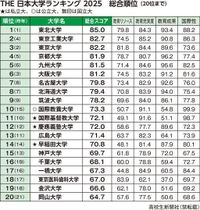On April 3, 2025, the British education magazine Times Higher Education (THE) unveiled its "THE Japan University Rankings 2025" in collaboration with the Benesse Group. This year marks the fifth consecutive time that Tohoku University has claimed the top spot in the overall rankings, a significant achievement that underscores its commitment to quality education and research.
In this latest ranking, the Tokyo Institute of Technology (also known as Tokyo University of Science) secured second place, while the University of Tokyo followed closely in third. These standings reflect a competitive landscape among Japan's higher education institutions, which have been assessed based on various criteria.
Since 2017, THE has published rankings specifically for Japanese universities, previously known as the "THE World University Rankings Japan Edition." The rebranding to "THE Japan University Rankings" aims to provide a clearer focus on the unique strengths and challenges faced by universities in Japan.
The rankings are derived from an analysis of the educational environment, the quality of student learning, and growth potential. The evaluation uses 16 indicators across four main areas: "Educational Resources," "Educational Fulfillment," "Educational Outcomes," and "Internationality." This comprehensive approach helps to highlight the multifaceted aspects of university performance.
Notably, since 2019, a "Student Survey" has been incorporated into the rankings, utilizing 11 common questions aligned with those in the American and European versions. This addition aims to capture the perspectives of current students, providing a more holistic view of the educational experience.
This eighth edition of the rankings evaluated a total of 257 universities across Japan. In the overall standings, Tohoku University maintained its first-place position, while the Tokyo Institute of Technology climbed from fourth to second. The University of Tokyo, which was previously ranked second, slipped to third place, demonstrating the dynamic nature of these rankings.
Following the top three, Kyoto University and Kyushu University took the fourth and fifth spots, respectively. Kyoto University improved its standing from fifth place last year, while Kyushu University also advanced from sixth. One of the notable highlights of this ranking is the International Christian University, which made a significant leap of five places to secure tenth position, marking its return to the top ten for the first time since 2020.
In the field-specific rankings, Tokyo Medical and Dental University excelled in "Educational Resources," retaining its first-place position. Meanwhile, International Christian University led in "Educational Fulfillment," and Kyoto University continued its dominance with the top rank in "Educational Outcomes." The category of "Internationality" saw a remarkable rise for International Christian University, which jumped from twelfth to first place, reflecting its growing commitment to fostering a global educational environment.
Phil Baty, THE's Chief Global Affairs Officer, commented on the rankings, stating, "After the challenges of recent years, it is encouraging to see national universities, particularly those with a high proportion of study-abroad students, gradually returning to pre-pandemic levels of student mobility. Notably, one of these universities, International Christian University, has made a strong comeback into the top ten since 2020." This statement emphasizes the resilience and adaptability of Japanese universities in the face of global challenges.
As the landscape of higher education continues to evolve, the "THE Japan University Rankings" serves as a vital tool for prospective students, educators, and policymakers. By providing transparent and comprehensive evaluations, these rankings help to inform choices about education and investment in Japan's future.
In summary, the 2025 rankings showcase the ongoing competition among Japan's universities, with Tohoku University leading the pack for the fifth consecutive year. The shifts in rankings among other institutions highlight the dynamic nature of academic performance and student satisfaction in the country. As educational institutions continue to adapt and innovate, these rankings will undoubtedly play a crucial role in shaping the future of higher education in Japan.








